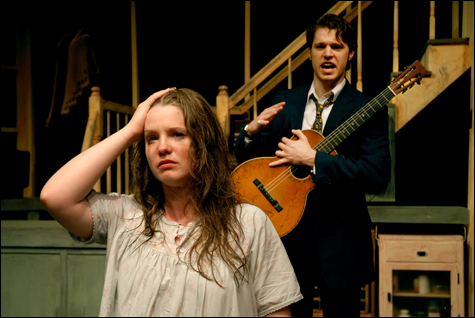A brutal world2nd Story’s Orpheus Descending April 2,
2008 4:51:09 PM

POURING IT ALL OUT: Sorensen and Maddock.
|
Orpheus Descending is such an urgent work that you can see how Tennessee Williams allowed an earlier version of it to pop squalling into the world before it was fully gestated. Currently, 2nd Story Theatre is staging a production (through April 20) that brings out much of the play’s life-and-death immediacy.
The part of the Greek myth that the title refers to has Orpheus, the greatest of musicians and inventor of the lyre, journey down to Hades after his wife Eurydice dies on the day of their wedding, to beg for her return to life.
Inspired by the myth rather than committed to its worldview, Williams makes little attempt to follow even that minimal plot line. He’s interested more in the general metaphor of an artist’s sacrifices and tribulations. Christian mythology is more significant to the playwright, as he fashions his Orpheus as a reluctant savior of which this brutal world is not worthy.
On his 30th birthday, the wandering Val Xavier (Kyle Maddock) slips into a small Southern town with his guitar and a new-found attitude that his hard-drinking, hard-living life must change. Wearing a snakeskin jacket that is his trademark, he wants to slough off his old ways. And that includes being no woman’s snorting stud, which is bound to complicate the arrival of a handsome young man in a land of unattractively feral men.
The most likely woman to pounce is Carol Cutrere (Laura Sorensen), the village brazen hussy and self-described exhibitionist. Williams eventually softens her carefree hedonism when she tells Val how the townsfolk despised her and had her arrested for a one-person march in a burlap sack to protest the ill-treatment of blacks. (The N-word is sprinkled throughout this play, and it’s not Negroes.)
The most benign character to begin with is Vee Talbott (Lynn Collinson), wife of the quietly mean sheriff (Vince Petronio). She channels her sexual frustration into a religious hunger for Jesus. She’s a painter and visionary, who trusts her feelings about things, so she’s proud of painting a church steeple a fiery red. Vee talks to Val about the drain and elation of creativity, and by the end of the play her two ardent skills end up striking her blind. By that point, our caring for her has less to do with sentimental obligation than with Collinson’s engaging depiction.
Vee has no carnal designs on Val, and initially neither does Lady Torrance (Rae Mancini), the proprietress of the dry goods store where the action takes place. She is the daughter of an Italian immigrant who settled in this town when she was a girl, opening a festive wine garden and making the mistake of selling liquor to blacks. Because of that, a mob burned down his orchard and her father was burned to death trying to save it. Lady has been married for 20 years to a bitter old man, Jabe (Tom Oakes), who has come home from the hospital, likely to die. By the cataclysmic end of the third act, Lady learns that he was one of the men who killed her father.
Director Mark Peckham lets Oakes all but spew spittle in portraying a man boiling with bile. Because of Oakes’s skill and because the character was written to epitomize such hatefulness, the performance is overwhelming instead of over the top, as it so easily could have been. What also allows that is a wonderful convergence, as Williams builds our expectations to the bursting point and the key characters tumble helplessly as if in a rapids, toward the fated culmination of each.
Mancini’s vividly inhabiting Lady is even more powerful than that of Oakes, because the performance grows tentatively and gradually, sometimes drawing humor from lines and situations not evident on the page. By the end, the effect is a wonderfully well-rounded person who we believe could save Xavier, if he hadn’t concluded that love is “the make-believe answer” to life. Maddock’s Val Xavier is an honest and convincing performance, intense. I would have appreciated, though, some similar extra dimensionality, perhaps backing off at some moments instead of always plunging ahead, to inform us that this bringer of beauty into such a forlorn landscape is fueled by more than ego.
On a set designed by Trevor Elliott that’s realistic but mysterious (characters emerge from background darkness), with moody lighting and sound design by Ryan Maxwell, these 17 actors do well in making metaphors seem quite solid.
|
 |

|
- Trying to find some meaning in ace biz-boy columnist Steve Bailey’s move to London
- How did BU's research facility go from slam dunk to almost sunk?
- Big fat whale
- What is driving the widespread movement pressuring Hillary to drop out, even though she is very much still in the race?
- Bill James teaches the Sox to play by the numbers
- Never mind its tough-girl alt-porn feminism: SuicideGirls has already moved on to a new generation
- How did BU's research facility go from slam dunk to almost sunk?
- 2nd Story’s Orpheus Descending
- Ray Davies hits the road
- Trying to find some meaning in ace biz-boy columnist Steve Bailey’s move to London
- Bill Gage has Down syndrome. And his band rocks
- Opera House captures Boston Ballet’s heart
|
-
Mark Peckham directs a ‘scary piece’
-
Literary life
-
Gamm’s Boston Marriage is a ticklish toss-off
-
The Narragansetts’ Stories in Stone
-
Cornerstone revives Neil Simon’s Biloxi Blues
-
Michael Morse’s Rescuing Providence
-
The Left Bank meets the West Side
-
Theater of Thought’sBash is a must-see
-
Brown tackles Ibsen’s knottyPeer Gynt
|

|